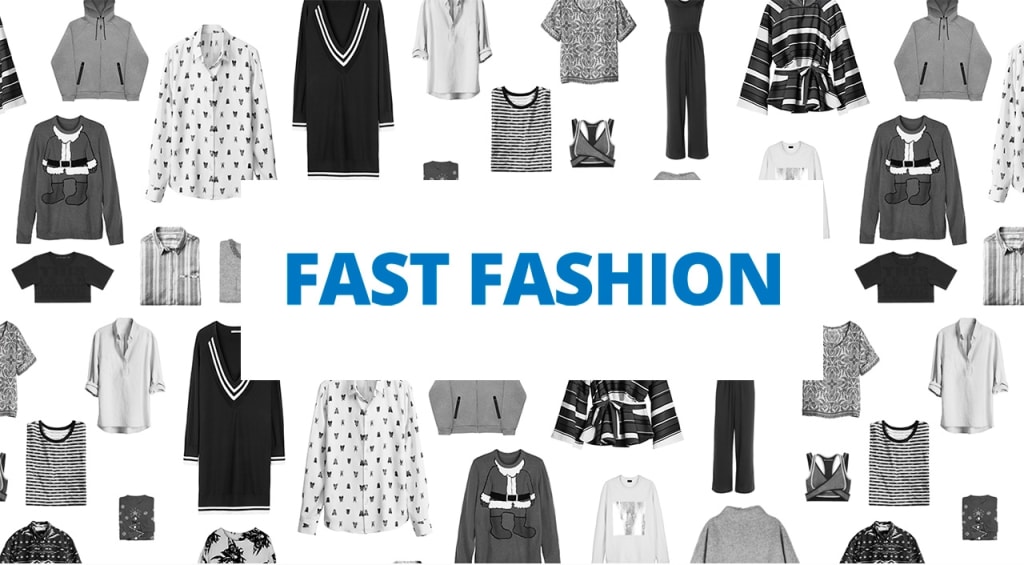
The documentary The True Cost is an eye opening documentary which explores the idea of fast fashion, and its varying affects on our environment, on factory workers, and can also be a way to look at how the fashion industry uses adolescents to create a constant need for their products. The film exposes the dark sides of the fashion industry, which are both unsettling and disturbing. Once it is seen what goes on behind the scenes of our clothes, it is unlikely to ever view the fashion industry as the glamorous industry it may have previously been seen as.
After watching this movie, I was shocked to see how selfish the fashion industry is. Since coming to college, many of my courses have spoken about the greed of corporate America, challenged our capitalism, and questioned how we live and treat this earth overall, all countries together. One course, Catholic Intellectual Teachings (CIT), recently discussed capitalism in America and how it violates the fourth claim of the Catholic Intellectual Teachings, which states that, “the dignity of every human being is inviolable and the commitment to justice for the common good is necessary.” The fashion industry violates this claim so greatly, being as they exploit their factory workers, material workers (those who farm for cotton, produce leather, etc.) and how harmful the production of their clothes is to our environment.
Because it is 2018 and we have as much technology and knowledge as we do, one would assume that all big businesses are doing their work in the most ethical ways possible in order to help our constantly suffering environment. The fashion industry has become the second biggest polluter in terms of big corporations, coming in second to the oil industry. Being that fast fashion has only been in existence for about a decade or two, this shows how hugely fashion is dragging down our environment. In the many ways of the fashion industry being unethical, its constant harm to the environment should be the one way we fight back on most and should concern ourselves with making sure how fashion companies make their clothes changes.
While discussing capitalism in America, a large proportion of the conversation was on Big Pharma, or the four big pharmaceutical companies in America. The ethical standings of the corporations were questioned, being how Big Pharma will raise the prices of a drug with high demand, such as the EpiPen, which spent up several thousand dollars in price after seeing the large increase of severe allergies in children. Why is it that big corporations feel they are above the law and being ethical? While Big Pharma as large payouts which take care of their workers and mostly the company heads, they are exploiting their consumers. Obviously, the fashion industry exploits their workers, but they also exploit their consumers through their advertising and pushing the ideals of materialism and always needing more. Psychologists have proven that there is a direct link between the rising importance of materialism and the rise of psychology issues. People who are more focused on what they have, and always having more are more likely to feel unhappy with their lives. But at the end of the day the choice is between ethics and dollar signs, which any big corporation is unwilling to give up.
Another similarity between Big Pharma and the fashion industry is how they use the business of some of their products to benefit the business of their other products. Big Pharma will often create a drug to cure one ailment, and then make other drugs to help with the side effects of the drug used to cure the ailment. The fashion industry has patented genetically modified (GMO) cotton, so that other companies cannot use this cotton. Because the farming of GMO products is hazardous to the farmers, these same big companies will also make drugs to help farmers after they are sick from the chemicals they work with, which more than doubles their profits. This is just another example of challenging ethics for greater profit.
Factories where clothing is produced are almost completely located overseas in third world countries where there is very little protections and rights for workers and where manufacturing can be done at a fraction of the cost it would be to have the clothing made in America. In fact, only three percent of clothing is actually manufacturing in the United States, and while it is vastly known that most “American” products are made overseas, three percent should be a number that astonishes anyone. While America as a country is mostly concerned with themselves, this percentage needs to raise questions as to why we are allowing 97 percent of our business in the fashion industry be run in other countries. Of course, the lower a product is made for, the lower it will sell, which means the more people can consume while spending a fraction of the money they might have once had to. But what is the sacrifice in inexpensive, constantly changing clothing? For factory or “sweat shop” workers, this means putting yourself in a position of constant loss. Workers receive wages as low as ten cents a week, working twelve to fourteen hour days, and are forced to live in ghettos located near the factories they work in. Most workers suffer, having to chose between using their low wage to pay rent, or to feed themselves or their children. In fact, many workers are forced to send their own children to live with distant family in communities outside of big cities (where factories are located) in order to ensure that their child will live a higher quality life than what they can provide them.
Aside from the heartbreak of living apart from their children, factory workers have to work in factories which are often breaking at that foundation, do not have proper ventilation or fire escape routes, and work under extremely violent management. These conditions have often lead to tragedies, such as the collapse of Rana Plaza, where over 1,000 workers lost their lives because management of the building continuously ignored their concerns about the unsafe work conditions. This is not the only tragedy of its kind, and this was not the only time that managers ignored the concerns and needs of their employees. There have been several instances where buildings have collapsed or set on fire, leaving hundreds of thousands of workers to helplessly die. When workers demand change, forming unions which peacefully work to show their thoughts and concerns with their workplace, they are met with violence. One of the women in the video, who was a factory worker herself, described how she led a worker’s union in her factory which made a list of changes they wanted to be met in order to feel safer and happier in their place of work. After handing the list over to management, her and her coworkers were locked in the room they do their work in and were violently beaten.
Being born and raised in America, I have always been given all the freedoms promised to me, and was always protected under laws. As I became a teenager and started working my own job, I thought I would never have an uncomfortable experience with my management or coworkers. While working in the snack bar of a country club, myself and fellow female coworkers all felt belittled and harassed by the male management and kitchen workers. They would make sexual advances at us, and make comments such as “the women are put behind the counter to do what they do best, cleaning and cooking.” I remember how uncomfortable this treatment made me feel, and now I cannot even complain about treatment I’ve received at work when people overseas are being brutally beaten and risking their lives each day they go to work. The sacrifices they make to work these jobs is outstanding, and the fact that big corporation such as Forever 21 allow such exploitation is sickening.
One quote in particular from the movie stood out to me, and was made by a factory worker named Shima. Shima sent her son to live with family so he could receive an education and because her long shifts made her unable to provide a life for her son that she wanted for him. When she spoke about working in a factory and making our clothes she quickly got emotional and said, “I believe these clothes are made with our blood.” When we look at clothes, we often get happy at the thought of buying new ones, wearing outfits that make us look and feel good, but for hundreds of thousands of workers, clothes mean something so different. They mean violence, they mean unsafe work conditions, they mean exploitation, working for hours on end for a salary that doesn’t allow you much more than to pay rent on a small hut with no running water or electricity and feeding yourself a meal a day.
Like I mentioned, this movie made me take a look at the shopping I did, where and why I did it, and why I do so much of it. In almost all of my psychology classes, we discuss how large of a role media plays in our day to day lives, and advertisements have caused a huge revolution in how we live. Whatever the media says, goes. The media shows us how to look, how our bodies should be, it tells us what pretty people look like, and shows us endless amounts of products that will improve our lives once we buy them. The people in charge of advertising for big corporations know that to get you to buy their products, they have to make you feel as though you need them and that all your problems will be solved once you give in to their temptation. This has brought our society to a point where we solve our problems with consumption. We consume when we are stressed, sad, and even happy (celebratory). Consuming clothes constantly has become an integrated part of our lives which fast fashion thrives off of. Years ago, people would shop once a season and wear those same clothes until they fell apart or didn’t fit anymore. Fast fashion has allowed for us to constantly buy new clothes at lower prices.
Overall, seeing how toxic the fashion industry is to our world greatly disappointed me. I always knew that the corporate side of the fashion industry was harmful (how they advertise, pressures they put on body image, etc.), but seeing how much damage the industry does to our environment and how badly factory workers are exploited was heart-wrenching. I love shopping, and nothing is a better pick- me- up than ordering a whole wardrobe’s worth of new clothes, but The True Cost has seriously made me reconsider how often I give into fast fashion, and which companies I give my money to.
About the Creator
Anne
blogger, content creator and mama
find me on socials: @paranneting @anamesa_anne
zillenial






Comments
There are no comments for this story
Be the first to respond and start the conversation.